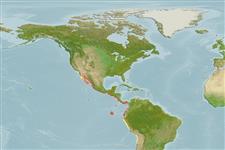Common names from other countries
>
Scombriformes (Mackerels) >
Scombridae (Mackerels, tunas, bonitos) > Scombrinae
Etymology: Scomberomorus: Latin, scomber = mackerel + Greek, moros = silly, stupid (Ref. 45335).
More on authors: Jordan & Starks.
Environment: milieu / climate zone / depth range / distribution range
Sinh thái học
Biển; Ở đại duơng, biển (Ref. 51243); Mức độ sâu 10 - 60 m (Ref. 91172). Tropical; 33°N - 27°S, 121°W - 70°W (Ref. 168)
Eastern Central Pacific: La Jolla in southern California, USA to the Galapagos Islands and Paita, Peru. Recently reported from Antofagasta, Chile. Many authors have erroneously considered this species to be a synonym of Scomberomorus maculatus, or a subspecies of it.
Length at first maturity / Bộ gần gũi / Khối lượng (Trọng lượng) / Age
Maturity: Lm 43.9, range 26 - 32 cm
Max length : 99.0 cm FL con đực/không giới tính; (Ref. 40637); common length : 60.0 cm FL con đực/không giới tính; (Ref. 168); Khối lượng cực đại được công bố: 8.2 kg (Ref. 4699)
Các tia vây lưng cứng (tổng cộng) : 15 - 18; Các vây lưng mềm (tổng cộng) : 16 - 19; Tia mềm vây hậu môn: 16 - 21; Động vật có xương sống: 46 - 49. Interpelvic process small and bifid. Body covered with small scales. Lateral line gradually curving down toward caudal peduncle. Intestine with 2 folds and 3 limbs. Swim bladder absent. Pelvic fins relatively long. Sides silvery with numerous round brownish (orange in life) spots, three rows above lateral line, one above. The first dorsal fin is black distally and white at the base. The second dorsal fin is tinged with yellowish and with black margin. The anal fin is white.
A schooling species believed to spawn close to the coast over most of its range. Adults occur near the surface of coastal waters to over bottom of the continental shelf (Ref. 11035). Adults feed on small fishes, particularly anchovies (Anchoa and Cetengraulis) and clupeids (Odontognathus and Opisthonema). The most abundant game fish along the Pacific coasts of Mexico and Central America. An excellent food fish enough to support a commercial fishery. Marketed fresh and frozen; also used for ceviche (Ref. 9987).
Life cycle and mating behavior
Maturities | Sự tái sinh sản | Spawnings | Egg(s) | Fecundities | Ấu trùng
Collette, B.B. and C.E. Nauen, 1983. FAO Species Catalogue. Vol. 2. Scombrids of the world. An annotated and illustrated catalogue of tunas, mackerels, bonitos and related species known to date. Rome: FAO. FAO Fish. Synop. 125(2):137 p. (Ref. 168)
IUCN Red List Status (Ref. 130435)
CITES (Ref. 128078)
Not Evaluated
Threat to humans
Harmless
Human uses
Các nghề cá: Tính thương mại; cá để chơi: đúng
Các công cụ
Special reports
Download XML
Các nguồn internet
Estimates based on models
Preferred temperature (Ref.
115969): 19.4 - 28.9, mean 25.8 (based on 80 cells).
Phylogenetic diversity index (Ref.
82804): PD
50 = 0.5000 [Uniqueness, from 0.5 = low to 2.0 = high].
Bayesian length-weight: a=0.00617 (0.00404 - 0.00942), b=2.93 (2.81 - 3.05), in cm Total Length, based on LWR estimates for this species & Genus-body shape (Ref.
93245).
Mức dinh dưỡng (Ref.
69278): 4.5 ±0.8 se; based on diet studies.
Thích nghi nhanh (Ref.
120179): Trung bình, thời gian nhân đôi của chủng quần tối thiểu là 1.4 - 4.4 năm (Assuming tm=2-4).
Prior r = 0.57, 95% CL = 0.37 - 0.85, Based on 1 data-limited stock assessment.
Fishing Vulnerability (Ref.
59153): Moderate to high vulnerability (51 of 100).
Climate Vulnerability (Ref.
125649): High vulnerability (64 of 100).
